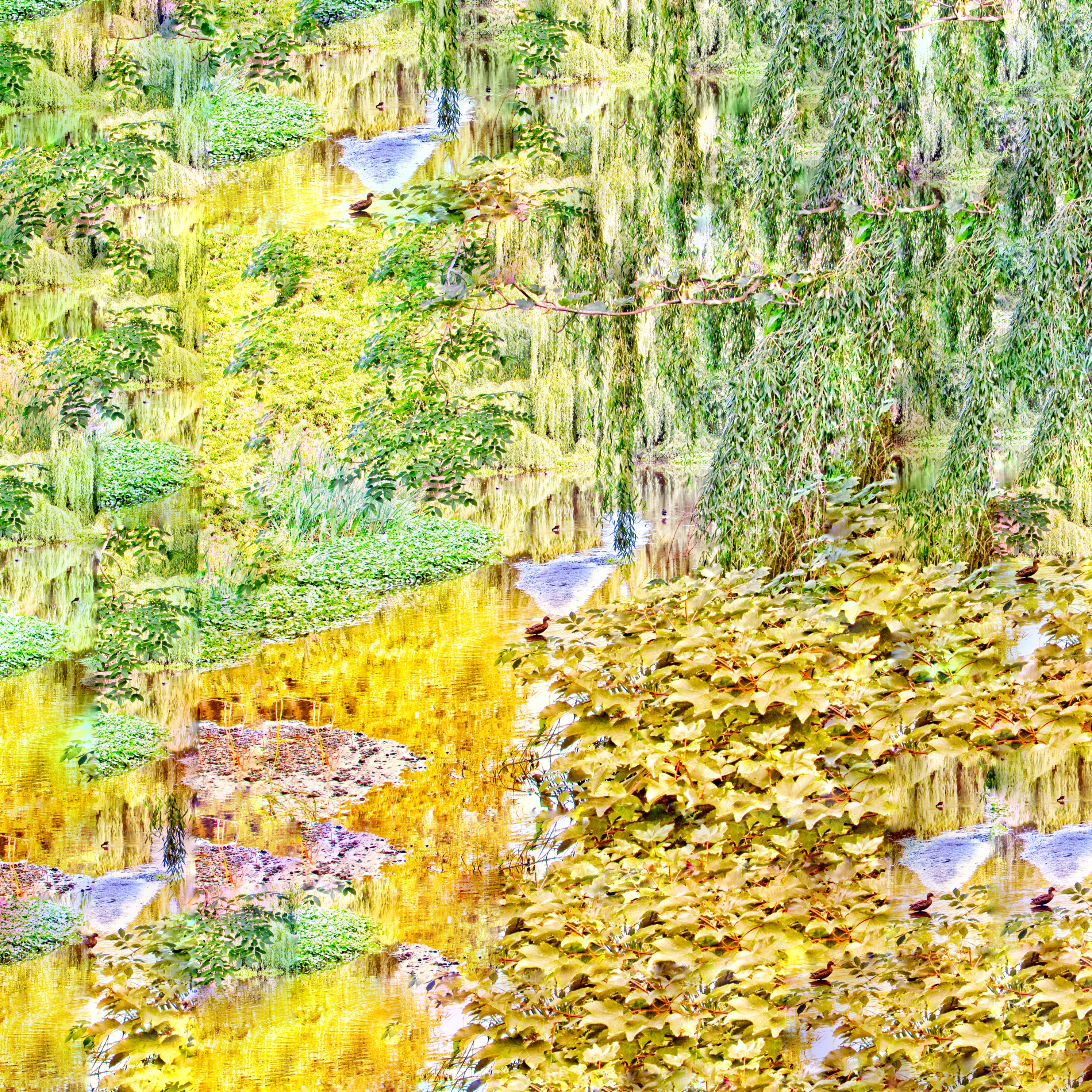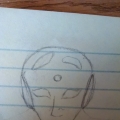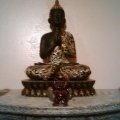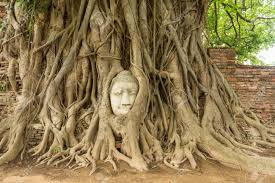Welcome home! Please contact lincoln@icrontic.com if you have any difficulty logging in or using the site. New registrations must be manually approved which may take several days. Can't log in? Try clearing your browser's cookies.
Can plants gain enlightenment?
 lobster
lobsterPureland Veteran
lobster
lobsterPureland Veteran

Believe it or not I consider my shell, rocks and plants sentient ...
It is all a question of degree. In an ideal Jain-vegan world, plants would have human rights. First we have to communicate with our vege-Bodhi sisters and Buddhas ...
https://www.nytimes.com/2019/08/26/style/can-plants-talk.html
Is a tree and other greenery sentient?
Oryngham
4





Comments
(Just a quick FYI, if you cancel the loading of the NYT page before it puts up its log in wall you can read the article.)
Personally, I think the plants communicating with her is more her tapping into her own subconscious. Anyone could use God or imagine a wise person, even a wiser version of yourself to get back helpful answers.
How about altruistic slime mold?
https://scienceandbelief.org/2015/08/27/cooperative-slime-a-sociable-amoeba-that-sheds-light-on-altruism/
Caught up in the whole discussion is what is meant by sentience, consciousness, intelligence, behavior, experience?
A great question @lobster , something that has interested me for a long time.I did read somewhere that some Buddhist cosmologies do include the plant kingdom, but I have not come across it myself.
Oh and thanks for that wonderful picture.
There are some references in the lore about animals that can gain enlightenment, so why not trees and plants? I remember reading a scientific article which said that cutting down a tree with an axe caused measurable changes in the physiology of other trees around it.
But I don’t think trees and plants experience consciousness and thought the way we do, and hence the enlightenment of plants is likely to look quite different as well.
My mother for instance had a very special relationship with a big old beech tree down in the village. She was once walking past it in the days after her mother (my grandmother) died, and she felt it speak to her. Ever since then, whenever she walks near that tree, she converses with it.
Hi @Kerome I did read once an article about plant/human communication. It was the view of the author that people were mistaken and that it was actually the associated nature spirit that they were communicating with.
I had not come across the idea of botanic life experiencing enlightenment, but who knows? I was actually thinking about realms of rebirth.
I have always maintained that they are. On the question of enlightenment, I'm not so sure. In order to become enlightened, is it first necessary to become deluded? In the primal unity, as I understand it, there is no such dichotomy.
Can a tree be described as deluded? If not, how could it become enlightened? The question, perhaps, becomes - does a plant still walk in the garden of Eden, or have they, and hence all living things, fallen into the error of dualistic understanding. If the latter, then enlightenment is a possibility. If the former, then no, enlightenment is meaningless for them.
As for rocks, I wouldn't touch that one with a barge pole.
What is or is not sentient, would depend upon one's imagination....
Are you asking if vegans & vegetarians can gain enlightenment ?
After all...."You are what you eat some say...well at least I'm not a gluts...along with a little fruit and vegetables ...I'm quite happy being nuts !"
Plants can participate in pleasant listening consciousness right? Like a viola or peaceful sounds of raindrops on the tree branches.
Ditto
As a fanciful aside, the turn of the century scifi show Farscape featured a character that was from an evolved race of sentient plants, Delvians.
Chan Master Sheng-Yen talking about plants. TLDR: No
Sheng-Yen, then, asserts that trees are insentient, in part because they have no memories, but this is in fact an unsupported assumption. (nothing against Sheng-Yen here - even the enlightened human mind can make factual errors because even the enlightened human mind must work with an incomplete set of data)
I strongly recommend the book The Hidden Life of Trees, by Peter Wohlleben. Many fascinating things to learn here, regarding memory and communication among trees in the forest.
I think it's quite controversial what buddha nature qualities are and what a sentient being is. So har to say.
Is there anything that it is like to be a tree? A robot can detect (see) objects and engage in behaviors with them (avoid them, open a door, etc.), does that mean there is something that it is like to be a robot? Trees can communicate with each other, grow towards beneficial things and away from harmful ones, but does that mean there is a conscious mind that experiences those behaviors? What is the distinction, if any, between complex behavior and sentience?
My question would be: where is the cut-off in terms of a discrete "I?" Is every leaf or branch on a tree separate, having it's own "I" - or is only the tree itself as a whole sentient in terms of an "I."
Secondly, how should this sense of I have formed in the first place? And when? Was the sense of "I" in utero; when the tree was only a seed? Before that was it in nirvana or free of the "I" sense? I honestly don't think we can ever really know these things.
I do believe bugs are sentient, but that too may be just my own prejudice.
Personally I don't believe in reincarnation because that involves way too many variables. But again, that could be my prejudice....
Perhaps plants and microbial life, and fungi and such, are more "sportive" aspects of "lila" but do not have a discernible "I" in the same way more complex and (self-directed?) species of life are... that's kinda my take.
A lot of engaging questions here, with no solid answers. Basically, I think, we end up disputing the meaning of words. The most basic and simplest definition of sentience in standard English is - Able to perceive or feel things. Hence trees must be sentient -since they respond to stimuli, they must by inference perceive the stimuli. Other definitions include the ability to reason and to think, and by those definitions trees would appear to be excluded from the club.
Perhaps quite arbitrarily, I go by the simplest and most basic definition and apply it exclusively to living things, while excluding robots, photocells, automobiles, power grids and the like.
And as the Ven. Sheng-Yen has pointed out, for the Buddhist, sentience is a quality possessed by animals, not by plants. It cannot be otherwise, since the first precept would else become an impossibility - we either kill plants, or we kill ourselves by not eating.
That's a useful distinction. Can you say what it is about life that makes a difference for you?
Thanks Everyone,
Interesting points. I particularly liked the realisation that trees are not deluded ...
Some other points.
Take root. Talk to our Friends. Branch out. I am Groot
"Bo" ......

@person said
At least in part it seems to be a matter of convenience. If non-living things were to be included - well, there's no bottom to that can of worms.
Nonetheless, if I were to take a hammer to one of the many nondescript rocks in my collection and bust it to pieces for no reason, I would feel distressed. Perhaps I regard them as beings, insentient yet created in the Tao. All quite illogical.
There's toy robot that is designed to react and emote to your behavior, it has a very basic awareness of its environment and unsophisticated responses. This short video is part of an experiment to see how people empathize with robots. I wonder if anyone feels anything towards this non-sentient bit of matter when it is treated cruelly? How will you feel when robots are autonomous and very lifelike? Isn't everything made up of non-sentient matter? Is it a matter of complexity when the inanimate world becomes something we start caring about or are our brains just seeing patterns in the clouds that aren't really there? And how can we really tell the difference?

According to the teachings, plants are not considered sentient beings.
And only humans have the "hard-wiring" to achieve enlightenment. Which is why having a precious rare rebirth AS a human is considered a precious life.
It is all a question of degree. I think this sentiment is important and I'm happy this conversation happened.
When I think of this I look at a mighty oak as compared to a blade of grass. One is so much more complex than the other. If I can imagine any kind of awareness to the blade of grass whatsoever, it stands to reason the oak tree might be a few degrees more aware.
I don't think the tree could ever become enlightened because that would mean it could suffer illusions such as the sense of self or individuality we envision with the brain.
Without the brain, I'm not so sure there would really be too much distinction between all there is or sentience exactly so a plant could simply just (just?) be the universe as far as it's (not) concerned.
With this distinction in mind, I think vegetation would come at it from a different angle altogether so maybe just to keep it simple we should ask whether or not a plant can wake up or just simply be awake? Perhaps even as an extension of the universe or whatever.
I think it's a possibility but on the probability scale, I can only say that if the conditions are favorable then so are the chances.
I don't know if I'm up for the implications.
@Person, did you catch that youtube took down the robot fighting videos citing animal cruelty?
That's probably off topic now but had to put that out there. Maybe a new thread there?
I hadn't, that's interesting.
Looking it up, apparently it was a improperly educated visual AI algorithm that misidentified them as animal fights. It was appealed and they are allowed on now.
I guess the question we all should be asking is was it reeeealy a malfunctioning AI or the first indication of AI gaining self awareness and banning what it sees as barbaric. 😏
What if like a Marvel comic situation happened where it was revealed that you were Elon Musks experiment making a sentient Robot.
And what if they told you that they thought they had failed at making you sentient. To their estimation you were not sentient. And they showed how they had made you a biological robot.
Would you then say "well I guess you guys know your stuff I guess I am not sentient?"
So then how are we confident a Robot or AI we might imagine is not sentient?
I know it doesn't have an answer but there might be something to just pondering not to figure out really.
I was kind of thinking the same thing. The interviews with Sophia the robot (AI) gave me chills. If you haven't seen them I'd recommend checking them out on youtube as well.
Sometimes I think the universe is a bit digital by nature and that a true digital intelligence might just see us as the artificial ones.
Yes, we don't really have any way to measure whether something is conscious or sentient or what have you.
I know I am conscious. If I'm being real though I can't say for sure that anyone else is. I think it is a good and healthy assumption though. Other humans behave in similar ways and they have the same biology that I do. It seems most likely that they too are conscious and not a philosophical zombie.
Personally I think it is also reasonable to assume that vertebrates and some invertebrates, with brains and central nervous systems are conscious. Its like where do you draw the line though? Complex behavior doesn't seem like a good indicator though. Plants have complex behavior, slime molds have complex behavior, robots have ever increasingly complex behavior.
Plants have the potential for enlightenment. All sentient beings have the potential for enlightenment. as a human being, I have no means of effectively communicating with plants. So, I can not say whether plants have the mean or not. But plants do indeed have the potential.
Peace to all
Great. Now I can't even eat broccoli either.
According to Buddhism, plants are not sentient beings, so eat the all the broccoli you want!
The man who believes trees talk to each other
There is actually, absolutely no doubt in my mind whatsoever that trees - and other genres of plants - do communicate, but certainly not at any level of intelligence that could be called sentient.
Plants establish survival tactics, and though cross-pollination and close proximity to other plants of the same type, they can genetically, via soil and pollination, pass information and newly-evolved tactics.
I don't believe they sit there chatting about Doris' varicose veins, or just how much the cost of mulch has escalated, but I do believe they have a means of communicating that is far more sophisticated than one would think.
The sense of I makes all the difference.
The sentience of plant life is a lively and active debate in Buddhism. In some Buddhisms, plants are denied sentience and are form without consciousness. In some Buddhisms, plant life and simpler organisms are classified as beings with less than five aggregates (much like the formless devas, who only have two aggregates: the activities saṁskārā and mind vijñāna).
Contrast this with Venerable Dōgen:
(Shōbōgenzō T2582.97c11-17)
Ven Dōgen comes from a Yogācāra framework of mind. Compare this with the earlier Sautrāntika framework presented by Ven Vasubandhu in Abhidharmakośakārikābhāṣya:
(Shinjo Kawasaki, Researches in India & Buddhist Philosophy, Section B: "Karma Theory," Chapter 5: "Principle of Life According to to Bhavya," Motilal Banarsidass Publishers Ltd., 1st Ed., Delhi 1993, ISBN: 81-208-0994-7)
But Buddhism is nothing if not diverse. In 1975, Upāsaka Bill Brevoort, in Oregon in the United States, at his Dharma Centre, the Buddha Root Farm, hosted Venerable Xuānhuà, who had this to say to this audience:
(Ven Xuānhuà, Dharma Talk, 1975 Oregon)
Interestingly enough, AFAIK, the above has no precedent in Buddhist scripture. The scholastics are very persnickety about having mental continua seperate and distinct. To complicate the matter though, even in Abhidharma traditions like which Tibetan Buddhism finds itself based, there is the phenomenon of one master producing up to three tulkus: the reincarnated speech, the reincarnated mind, the reincarnated body, which violates the continuity of the mindstream as it is conceived of in various other schools.
This also seems to have no scriptural basis though, but I have not read any of the Tibetic tantra texts. They might have something in there.
@lobster your question leads the mind to many different paths that relate to the five precepts...and the different schools traditions & sects of Buddhism...
There are those practitioners who along with vegetables consume animal flesh ( sentient being from the obvious view point they know fear and feel pain, we humans can for the most part see this) and those who just consume vegetables/plant based food (which some practitioners also see as sentient beings, but it is less obvious to the average human being who for the most part can not observe fear and pain in the plant, we have to go by what scientists tell us, and even this research is somewhat sketchy when it comes to fear& pain of plants verses fear & pain of animals..bearing in mind we humans also belong to the animal kingdom .... in reality all food eaten is plant based ...think about it ).....
).....
So if plants are sentient in the sense of knowing fear and feeling pain then this would mean that either way( animal flesh consumption or no animal flesh consumption) all practitioners would be breaking the precepts every day just to stay alive and practice...
But I guess first one would really need to work out what enlightenment is...and more to the point what it would mean to a plant ...
Form is Emptiness...Emptiness is Form
Perhaps plants are in their own way enlightened...after all, without their self sacrificial offering.. would human being and other life forms (including other plants exist....
This actually sounds like a version of panpsychism with a spiritual story attached to it.
Thanks everyone very useful insights.
@Vimalajāti answer I found particularly helpful.
I have been trying to save one personal cherry tree 🍒
Grateful for that tree. It shaded. It raised blackbirds. It housed jasmine and a rose in its highest branches. A kestrel perched on it. Parakeets landed. Magpies raised their young. It flowered. It fruited. It sheltered all manner of being. It was breath and life. I called it mine but Cherry Groot is its own character ...
The tree execution squad (arborists) will be coming probably in the coming week. However they being dendrophiles (tree lovers) may advise an alternative course of action ... 👌🏽🕊👍🏻✅
Whilst cleansing the drain next to the tree, I heard rats whimpering. Cherry Groot may be nesting more life subterranean as well as the sky branch ... 🕊🐀🌳
Should I be pressured into destruction by our next door landlawd or save many lives from worms, rats to flying visitors of the future? 🐉🍀💦
We are Groot. 🌱🍃🍂🥀
Grateful for your consideration and life skills ... 🌈🦞🍒🌱
Just like us, every tree, every creature the tree houses is intertwined.
Can we Mahayanists save every tree? Even if we can not save every grain of rice ... 🤔
If your neighbour is insistent on chopping the tree, be sure to plant a replacement on your side of the fence, but as close to the cherry, as you can. Sequoias are nice, or leylandii... who doesn't love them - ?! The bully-boys of the arboreal community!
Sure, but if you continue reading, you realize that Dogen is not exactly speaking in a conventional manner, as is his style.
There really isn't any debate on whether or not a big rock out in space is, what is conventionally referred to as, a sentient being.
Well, the way I read it, he didn't say the rocks, trees, nation, sun, and moon had "their own" minds. He is coming from an East Asian Yogācāra background of mind. This was presented, in simplified form, as a dichotomy between "discursive consciousness" and "consciousness appearing as objects." This then interfaces with Shinto animism, where objects and even notions can have their own souls (Kami).
When consciousness manifests as objects to represent information the sense organ has taken from external forms, mind witnesses mind in the most general way.
It's like looking as a picture of a flower on a cell phone screen. Is that "picture of flower" or "cellphone?" It's both, in the same way a lamp witnessed is both a product of mind and an external object without contradiction. I think Ven Dōgen is saying you "are" your internal word, with all its inconstancy, including everything in it.
When I read Ven Dōgen's words, I think he is taking consciousness appearing as objects and saying: "This too is a part of me. With so much a part of me, my waking reality and the objects in it, where is my point of stability and constancy?"
As Buddhists, I imagine we can imagine the answer.
Do you have any resources to recommend concerning panpsychism? I have nothing but ideas as to what that could mean and no certainty. It brings to mind the statement "all is mind."
Then you are off-topic, and discussing a different matter altogether. The question focuses on whether plants/trees can gain enlightenment. Not whether they are 'Consciousness appearing as objects'.
THis is an entirely different slant and speaks of the object as a mental fruit of the observer.
The OP's question clearly asks whether plants can gain enlightenment. Under their own volition and existence, not as a component of ours.
I don't understand. I'm sorry.
Ven Dōgen, the way I am reading above, is questioning the division between the objects and the mind. If the mind attains enlightenment, what has happen to that which through the mind is known as objects?
Venerable Chuhung says "the pure land is the pure mind." Venerable Zhiyi says "the aggregates, sense gates, and objects of saṃsāra are the aggregates, sense gates, and objects of nirvāṇa."
If there is no self, "who" has achieved enlightenment to witness this pure land? They say that if I become enlightened, I will experience you as the Buddha. Is this your enlightenment or mine? If a Buddha sees a flower in their pure land, is this the flower's nirvāṇa or the Buddha's? Minds are awakened, but we know that minds have no owners. So is this the sentient being's mind or the flower's when consciousness manifests as the flower?
I'm sorry if I'm not understanding the conversation. This is how I understood it to be going.
I was focusing more on the last point of the original post:
I took it as an enquiry as to whether trees - and other greenery - had Minds of their own to walk their own path to Enlightenment without any 'visible means of support' or Human safety net...
Maybe it is I who has lost the meandering of the thread....
The NYU philosopher David Chalmers (originator of the "hard problem" of consciousness) is maybe the leading proponent of the idea. You can probably find a lot from wikipedia or Stanford's philosophy site.
My basic understanding is that all matter, down to the smallest bit, have a sort of primal, proto consciousness attached to it. That this proto consciousness is a fundamental property of the universe like gravity or electro-magnetism. Its not that everything has a mind, I believe the hypothesis is that it takes a certain level of complexity to achieve that, something like life needing a basic level of complexity to arise.
https://qz.com/1184574/the-idea-that-everything-from-spoons-to-stones-are-conscious-is-gaining-academic-credibility/
No illusion, no awakening.
No need perhaps.
The trees may have no brain or sense of individuality but no universal awareness that may be ever more finely tuned?
Sometimes I think the whole universe runs on instinct.
I would say that is true, as zen is quite fond of "mind-only". But at the same time, that is an ultimate truth. However, "can these beings attain enlightenment" as I see it, is really a conventional matter, not an ultimate one as ultimately per the Heart, Diamond Sutra, etc. there is no attainment, nothing to attain and no beings to attain it. But conventionally, there are such things.
But at the same time, that is an ultimate truth. However, "can these beings attain enlightenment" as I see it, is really a conventional matter, not an ultimate one as ultimately per the Heart, Diamond Sutra, etc. there is no attainment, nothing to attain and no beings to attain it. But conventionally, there are such things.
Just came across this in The Heart of the Buddha’s Teaching. (I know, I’m reading it very slowly...)
So I guess it’s what many people have said here: no illusion, no awakening. The leaf is the same as an enlightened being, except that it has no motivation to liberate other living beings. Any liberating it might do, like falling on a monk’s head and cracking open his consciousness in satori, would be completely by accident.